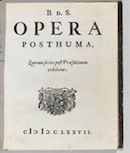
Selection from –Political Treatise - Chapter XI, of democracy (Page 1)
Spinoza's Words – (of democracy – all citizens may vote)
 I pass, at length, to the third and perfectly absolute dominion, which we call democracy. The difference between this and aristocracy consists chiefly in this, that in an aristocracy it depends on the supreme council's will and free choice only, that this or that man is made a patrician, so that no one has the right to vote or fill public offices by inheritance, and that no one can by right demand this right.
I pass, at length, to the third and perfectly absolute dominion, which we call democracy. The difference between this and aristocracy consists chiefly in this, that in an aristocracy it depends on the supreme council's will and free choice only, that this or that man is made a patrician, so that no one has the right to vote or fill public offices by inheritance, and that no one can by right demand this right.
In a democracy all, who are born of citizen parents, or on the soil of the country, or who have deserved well of the republic, or have accomplished any other conditions upon which the law grants to a man right of citizenship; they all, I say, have a right to demand for themselves the right to vote in the supreme council and to fill public offices, nor can they be refused it, but for crime or infamy.
Spinoza next criticizes his own proposal by saying that in the aristocratic council he described in the previous chapters. Patricians will always think those the best, who are rich, or related to themselves in blood, or allied by friendship. And, indeed, if such were the nature of patricians, that they were free from all passion, and guided by mere zeal for the public welfare in choosing their patrician colleagues, no dominion could be compared with aristocracy. But experience itself teaches us only too well, that things pass in quite a contrary manner, above all, in oligarchies, where the will of the patricians, from the absence of rivals, is most free from the law. For there the patricians intentionally keep away the best men from the council, and seek for themselves such colleagues in it, as hang upon their words, so that in such a dominion things are in a much more unhappy condition, because the choice of patricians depends entirely upon the arbitrary will of a few, which is free or unrestrained by any law. But I return to my subject.
We can conceive of various kinds of democracy. But my intention is not to treat of every kind, but of that only, "wherein all, without exception, who owe allegiance to the laws of the country only, and are further independent and of respectable life, have the right of voting in the supreme council and of filling the offices of the dominion." I say expressly. "who owe allegiance to the laws of the country only," to exclude foreigners, who are treated as being under another's dominion. I added, besides, "who are independent," to exclude women and slaves, who are under the authority of men and masters, and also children and wards, as long as they are under the authority of parents and guardians. I said, lastly, "and of respectable life," to exclude, above all, those that are infamous from crime, or some disgraceful means of livelihood.